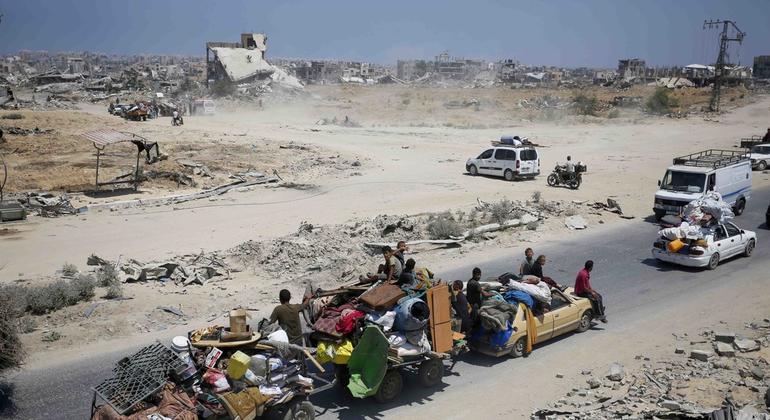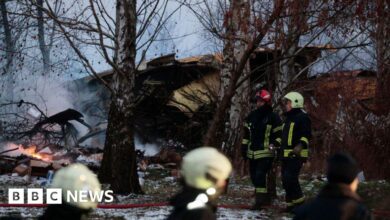Gaza residents struggling with hospital closures, malnutrition and heatwave risks, UN health agency warns


Press conference with journalists in Geneva, World Health Organization of the United Nations (WHOThirty-four people died of malnutrition and dehydration amid continued Israeli bombing, stemming from Hamas-led terror attacks on October 7, according to the enclave’s health authority, spokesman Tarik Jasarevic said.
“IN [northern Gaza’s] Kamal Adwan Hospital alone, 60 cases of severe acute malnutrition detected last week“A WHO spokesperson told reporters.
Easy prey for disease
“Malnutrition is definitely one of the factors that reduces immunity, especially in vulnerable populations, the elderly and children, who cannot really cope with any illness, any pathogen that they might get,” said Jasarevic, describing a “vicious circle lack of access to adequate food, clean water, sanitation, and basic health care services”.
Mr Jašarević expressed gratitude for the dedication of healthcare workers who returned to their facilities when they felt safe enough to try to restore vital services. Of the 36 hospitals in Gaza, only 13 are “partially functioning”he said
Medical center reopens
In more positive news, hundreds of Gazans have sought help at a newly reopened United Nations medical center in Khan Younis, six months after it was severely damaged and forced to close due to heavy fighting, the UN agency for Palestinian refugees (UNRWA) said on Tuesday.
The UNRWA Japanese Medical Center in Khan Younis provides primary health care, has a pharmacy and medical staff that had to flee as fighting and Israeli tanks rolled through the streets outside.
“People in Gaza are in dire need of health care, but only a small fraction of UNRWA health centres are operational due to ongoing military operations and damage and destruction to UNRWA facilities.”, said Louise Wateridge, Senior Communications Officer at UNRWA. United Nations News“Less than a third of our health centers are operational.”
She added that on the first day of resumption, 33 medical staff were on duty and assisted more than 900 patients seeking treatment.
‘The patient feels relieved’
Among the medical staff at the center, laboratory technician Abou Omar described the pain of fleeing with other Gazans in January as Israeli tanks approached. “I worked at the Japanese clinic for 20 years… I was there until the last day. It was a very bitter and difficult experience to be displaced. Our spirits lifted after hearing that the Japanese clinic was back in operation; the patients felt relieved.”
Today, the center provides pre- and post-natal care, blood testing, treatment of non-communicable diseases and critical outpatient services, after the UN agency led an effort to clear the facility of debris from bricks, glass and bullets.
Like many UNRWA health facilities, the Japanese health center operates two shifts to manage the influx of patients from 8 a.m. to 5 p.m. But transferring patients to UNRWA-contracted hospitals has become increasingly complicated by power outages and supply shortages, Wateridge said. Today, the agency has 100 temporary health posts and eight of its 26 functional health centers.
Mental health support
As of June 26, the UN agency was providing mental health and psychosocial support services in the Central and Khan Younis areas of Gaza with teams of psychiatrists and monitors to support special cases referred from health centers and shelters.
UNRWA teams responded to 626 cases at health centers and health posts through individual counseling, awareness-raising sessions and support for cases of gender-based violence. UN agency staff also provided medical care to 391 high-risk pregnant and postpartum women.
Not enough ability
The total capacity at the six partially operational hospitals in southern Gaza – including three in Deir Al Balah and three in Khan Younis – is just 1,334 beds.
Of the 11 field hospitals in the Gaza Strip, three have been temporarily closed and four are only partially operational “due to the hostile situation in Rafah and limited access,” the WHO said.
As for hospital infrastructure, “the extent of the destruction is so great that it is hard to imagine how long it will take [to rebuild] after the war ended,” Mr. Jašarević emphasized.
Tedros criticizes evacuation
“There is really no safe corner in Gaza”, WHO Director-General Tedros Adhanom Ghebreyesus stressed, warning in a online post that the latest reports of evacuation orders in Gaza City “will continue to hamper the provision of very limited life-saving care.”
“Al-Ahli Hospital and Patient Friendly Hospital are no longer in operation.; patients self-evacuate, are discharged early or transferred to Kamal Adwan and Indonesian hospitals, which are short of fuel, beds and trauma medical supplies,” the WHO chief added.
“Indonesian hospitals are three times overloaded. Al-Helou Hospital is located in the evacuation zones but is still partially operational. As-Sahaba and Al-Shifa Hospitals are located near the evacuation zones but are still operational so far. Six medical posts and two primary health care centers are also located in the evacuation zones.”
Nowhere and no one is safe
In addition to the direct consequences of the Israeli military’s continued shelling and bombing that continued overnight into Tuesday, “everyone in Gaza” is at risk of illness and death due to lack of care, Mr. Jašarević said.
The situation is particularly dire for pregnant women, people with chronic illnesses such as cancer or diabetes, people with injuries that do not receive timely treatment, and children at risk from waterborne diseases.
He reiterated the agency’s call for all border crossings into the region to be opened to allow for much-needed medical evacuations.
“More than 10,000 people need specialized medical care outside Gaza. These people can’t wait.,” he insisted.
Medical aid has also been delayed, and the UN health agency said no trucks from the agency entered Gaza last week.
Asked about the current state of medical facilities in the Gaza Strip, Mr. Jašarević said hospitals were being evacuated or destroyed by bombing, with no possibility of rebuilding until the fighting stops.
According to Latest emergency news from the United Nations Office for the Coordination of Humanitarian Affairs, OCHAIn just one week, patients and medical staff evacuated three hospitals in southern Gaza, “over fears that increased military activity could render medical facilities inoperable or inaccessible.”




